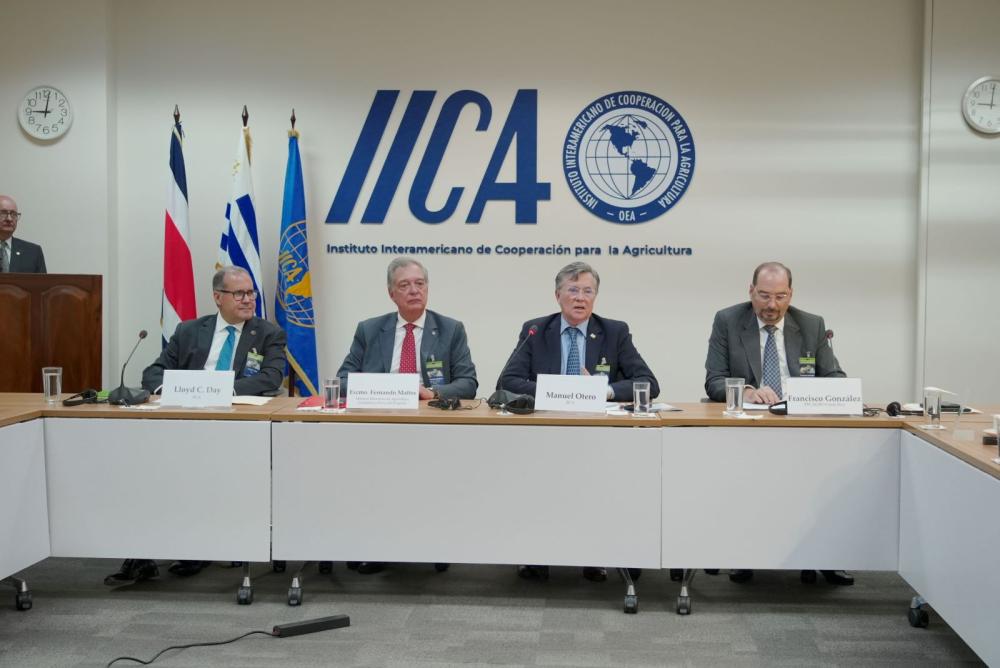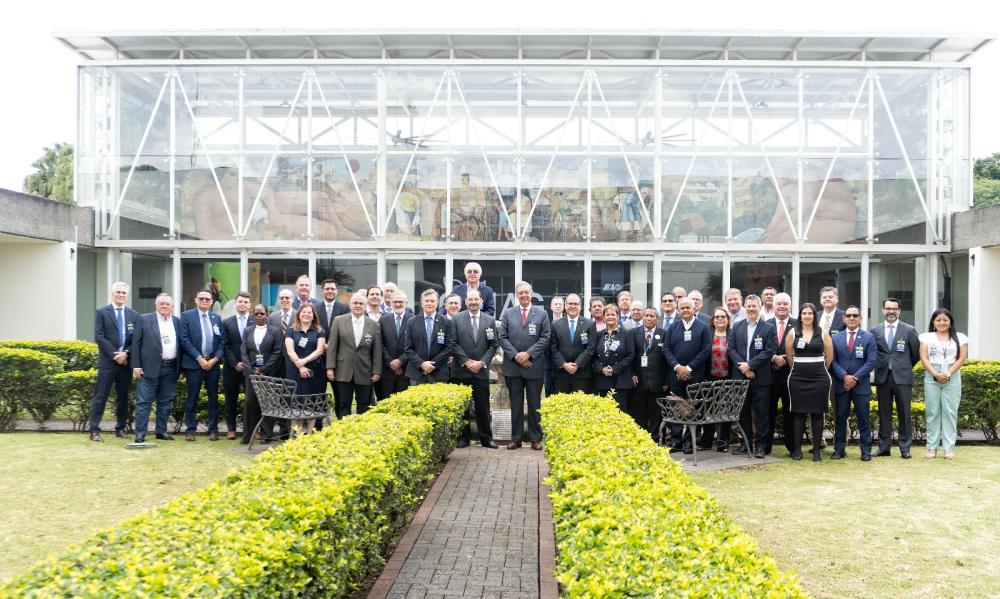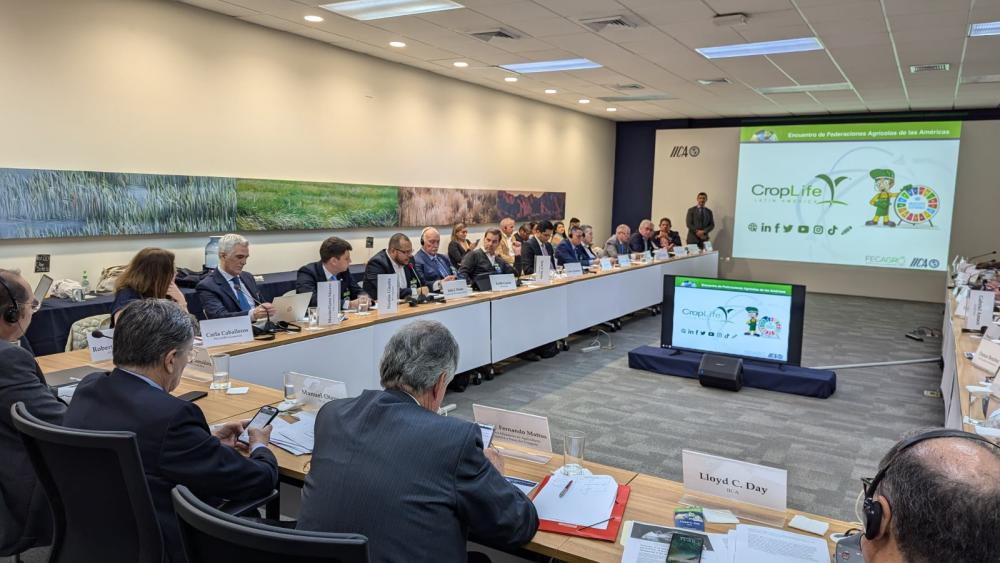Agricultural federations of the Americas and IICA agree to promote science and innovation to advance sustainable agriculture and increase the productivity of agrifood systems

San José, 23 July 2024 (IICA). Science, innovation and the use of new technologies are crucial to drive the development of sustainable agriculture, increasing its productivity, fostering transparent agricultural trade and meeting the growing demand for safe, nutritious and accessible food for human consumption, while at the same time playing a key role in climate change mitigation and adaptation in the sector.
This was one of the main conclusions of the first Meeting of Agricultural Federations of the Americas, organized in Costa Rica by the Inter-American Institute for Cooperation on Agriculture (IICA) and the Federation of Chambers of Agriculture and Agroindustry (FECAGRO).
The event attracted more than 40 participants, including senior officials, international experts, and leaders of 20 agricultural and agroindustrial organizations from 14 countries in the region.
The Minister of Livestock, Agriculture and Fisheries of Uruguay, Fernando Mattos; the President of FECAGRO, Francisco José González; and the Director General of IICA, Manuel Otero, made the opening remarks.
“In the next 25 years we are going to need fifty or sixty percent more food than we currently produce, it is a huge challenge, we have to harness science, innovation, technology and research to make that leap in production, and public-private sector coordination is essential,” Minister Mattos said.
“Investments in research and development, the promotion of sustainable agricultural practices within a regulatory framework that promotes environmentally friendly technologies, training in new technologies, accessible financing mechanisms for small and medium-sized farmers, the strengthening of agricultural value chains, and the establishment of fair and transparent trade policies based on scientific evidence are essential,” added the President of FECAGRO.
IICA’s Director General emphasized the fact that, faced with the substantive task of “feeding the world with plentiful, nutritious food in a sustainable manner, a systemic vision that recognizes all the actors is needed.”
“We must think about long-term policies, with farmers at the center of the debates and science and innovation in action as the principal input for good policies and the sustainable intensification of production,” Otero remarked.
During the meeting, there were keynote addresses on a series of issues: technology and innovation for sustainable agriculture; the challenges and opportunities facing the agricultural sector in the Americas; the challenges and opportunities in production chains; and access to freer, more open and transparent markets and trade. A technical note prepared by IICA was also presented, on the promotion of an integrated approach to agriculture in favor of food security and sustainable development in the Americas.
The speakers were, respectively, the Director of the University of Nottingham Food Systems Institute, Jack Bobo; the President of CropLife Latin America, Jose Perdomo; the Secretary General of the Pan American Dairy Federation (FEPALE), Ariel Londinsky; the current chair of the Committee on Sanitary and Phytosanitary Measures of the World Trade Organization (WTO), Tayutic Mena; and IICA international consultant and advisor and former Costa Rica Minister of Agriculture and Livestock and Ambassador to the WTO, Gloria Abraham.
In their presentations, the speakers took into account the context in which the sector presently operates, characterized by huge challenges such as climate change, the scarcity of water resources and soil degradation, a situation that underlines the crucial importance of sustainable agriculture in guaranteeing food security, and makes technological innovation and science-based international trade essential to improve farmers’ productivity and quality of life.

Agriculture’s most crucial years lie ahead
“The next 25 years will be the most important in the history of agriculture, the decisions we make today will determine the future of the planet, which is why we must unite to ensure that agriculture saves the planet. I am optimistic that science and technology can take us to the place we want to get to. We can have a better economic and environmental future if we believe in innovation,” said Bobo, who is also convinced that the agriculture sector in the Americas has been doing a good job and taking firm steps towards increasingly sustainable production, but “the process of improvement must be speeded up.”
Perdomo highlighted the fact that “what agriculture needs is more innovation and technologies to double its output.”
“Sustainability will create great opportunities for everyone, with innovation at the heart of all this, we must commit to improved seeds, digital agriculture, robotics, biological controllers for crop production, application technology, and more targeted fertilizers. The huge challenge for governments is facilitating producers’ access to those tools, more science is required to meet society’s demands, and to improve the communication of science and the benefits that innovation offers,” he said.
Tayutic Mena pointed out that the Americas is the continent that will provide the most solutions to food security in the next 10 years, but it will also be the one exposed to the biggest non-tariff barriers. Therefore, it must “find a way to innovate in agriculture that builds resilience, generating a more efficient production system.”
“There are opportunities in terms of better prices, market access, the creation of new value chains, links with environmental services, trade facilitation through digitalization. Science is the key, it is a question of creativity and innovation, more cooperation, multilateralism, and public-private partnerships,” he added.
Gloria Abraham mentioned that sustainable agriculture offers solutions to tackle current challenges and to guarantee food security, with technical cooperation and the sharing of best practices and technologies playing a key role in promoting actions aimed at stimulating socioeconomic growth and environmental sustainability.
asociaciones público-privadas”, aseveró.

The participants in the meeting also agreed that there was a need to develop a proactive communication strategy to boost the messages and topics of common interest in the sector, and to strengthen public-private partnerships.
IICA intends to support the participants’ call for the establishment of a Latin American and Caribbean Federation of Chambers of Agriculture and Agroindustry, and for a meeting to be held next year with representatives of all its members.
These actions and the conclusions of the first Meeting of Agricultural Federations of the Americas will be presented to some 15 ministers and deputy ministers of agriculture from the Americas and other senior sector officials when they assemble today for the Forty-fourth Regular Meeting of IICA’s Executive Committee.
The Executive Committee is one of IICA’s governing bodies and meets once a year. It is made up of 12 Member States, elected for two-year periods according to the criteria of partial rotation and equitable geographical distribution.
More information:
Institutional Communication Division.
comunicacion.institucional@iica.int